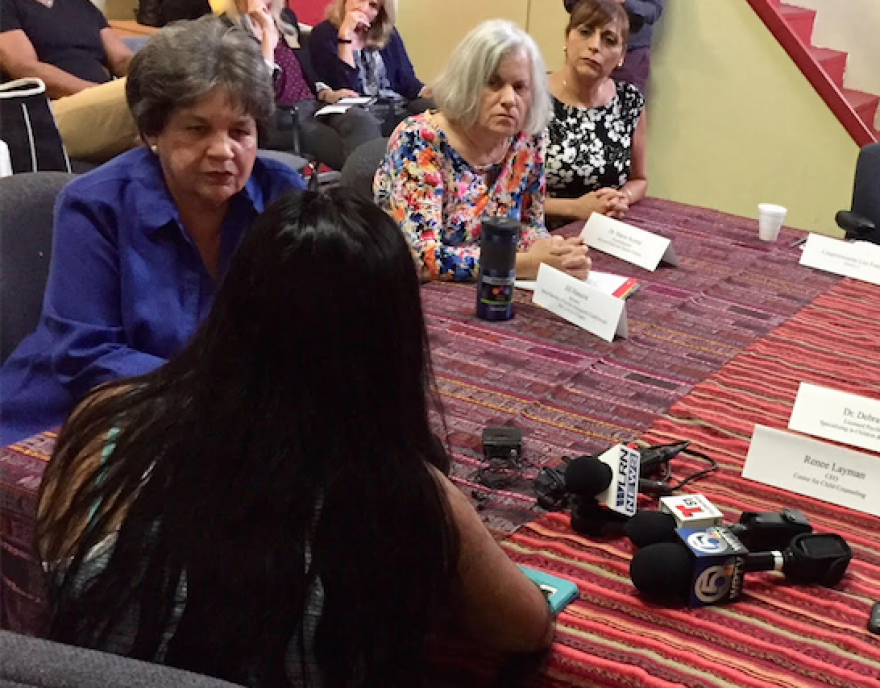Florida Congresswoman Lois Frankel recently toured the U.S. southern border, talking to undocumented parents and children separated by President Trump’s zero-tolerance immigration policy.
During a forum this month at the Guatemalan-Maya Center in Lake Worth, Frankel, a Democrat from West Palm Beach, heard how that border policy has begun to touch the Florida peninsula. Frankel interviewed a woman from Guatemala whose cousin was one of the migrants stopped at the border this year and separated from her child – a 10-year-old boy.
“And you know her son is in Homestead?” asked Frankel, referring to the facility there for unaccompanied migrant children or migrant children separated from their detained parents.
“Yes, Homestead,” said the woman, who was not identified because she too is undocumented.
“Has anybody [in the family] been able to talk to him?”
“No,” said the woman, whose voice trailed off as she added, “I can’t understand why the president separates the kids from the moms….”
“But you know that [the mom] has been sent back to Guatemala?”
“Yeah. Immigration deport her and the kid stay here….”
The mother is thought to have been deported back to Guatemala – without the child. Either way, it’s the sort of story heard more often now as a result of the separation policy.
READ MORE: Congressional Officials Denied Access to Undocumented Children in Homestead
Trump has since backed off that separation order. Still, psychologists say the trauma to kids like the Guatemalan boy could be crippling. How crippling was a big question Frankel’s Lake Worth gathering tried to answer.
“What does this mean to children?” she asked the child psychology experts and immigration advocates there. “What are the long-term consequences?”
“The toxic stress is affecting developments delays, specifically affecting the language area of the brain,” said Amanda Escalante, a Guatemalan-Maya Center coordinator who works with immigrant families in Florida and often sees those symptoms in children detached from parents who’ve been deported.
“The kids have bad dreams. And this affects the health of the child.”
Immigrant children who reported more of these traumatic experiences also reported more physical pain symptoms. –Ashley Marchante-Hoffman
Escalante and the other experts were largely describing the psychological effects of that toxic stress. But what’s less known are the harmful physical effects.
That’s changing, thanks to studies like one published this month by the University of Miami titled Giving Voice to Foreign-Born Latino Youth: Trauma, Stress and Health in the Primary Care Setting.
It’s a dissertation written by Ashley Marchante-Hoffman, who just received her Ph.D. in psychology at UM, and it involves ground-breaking research on the physical health effects of trauma such as parent-child separation on Latino immigrant children.
“This really came out of an experience at UM’s pediatric mobile clinic,” said Marchante-Hoffman, who spent two years with more than 150 of those children from South and Central America and Mexico who were patients at the clinic.
LOVED ONES KILLED
“More than 70 percent of them were reporting at least one traumatic experience, which included exposure to violence and separation from their caregivers,” said Marchante-Hoffman.
“And what I found was that they were experiencing headaches, stomach aches, sleep problems.” She added, “It can even result in more long-term physical complications like obesity and heart disease.”
Marchante-Hoffman also pointed out that parental separation is often more damaging because it often compounds previous traumas – like witnessing the gang violence that forces so many Latin American families to flee to the U.S. in the first place.

“Many of these children that I spoke with had loved ones killed” back in their home countries, Marchante-Hoffman recalled. “And children who reported more of these traumatic experiences also reported more pain symptoms.”
Marchante-Hoffman’s parents immigrated here from Cuba as youngsters. And she said she’s decided to devote her career to helping Latino immigrant children. She spoke to WLRN from Wilmington, Delaware, where she’s now doing that work.
One of her other key points is that Latino immigrant families rarely seek pediatric mental health services. As a result, she says more psychologists should be present at pediatric medical clinics that serve Latino immigrants. She feels that would better address how the mental trauma results in physical harm.
“All I can speak to is the importance of meeting these families where they are,” she said, “and preventing more long-term complications.”

Because so many Latino families in the U.S. are immigrants, those complications are a reality the broader Latino community is confronting more and more – especially amid the country’s increasingly anti-immigration environment.
That includes Latino communities like those in Lake Worth – where immigrants like the Guatemalan woman at this month’s forum had a message for Donald Trump:
“Why,” the Guatemalan woman asked, “he never thinks if somebody take his kids – how he’s [going to be] feeling?”
As more research like Marchante-Hoffman’s emerges, the country will at least have a better idea of how the kids are feeling.
WLRN's Peter Haden contributed to this report from Lake Worth.



